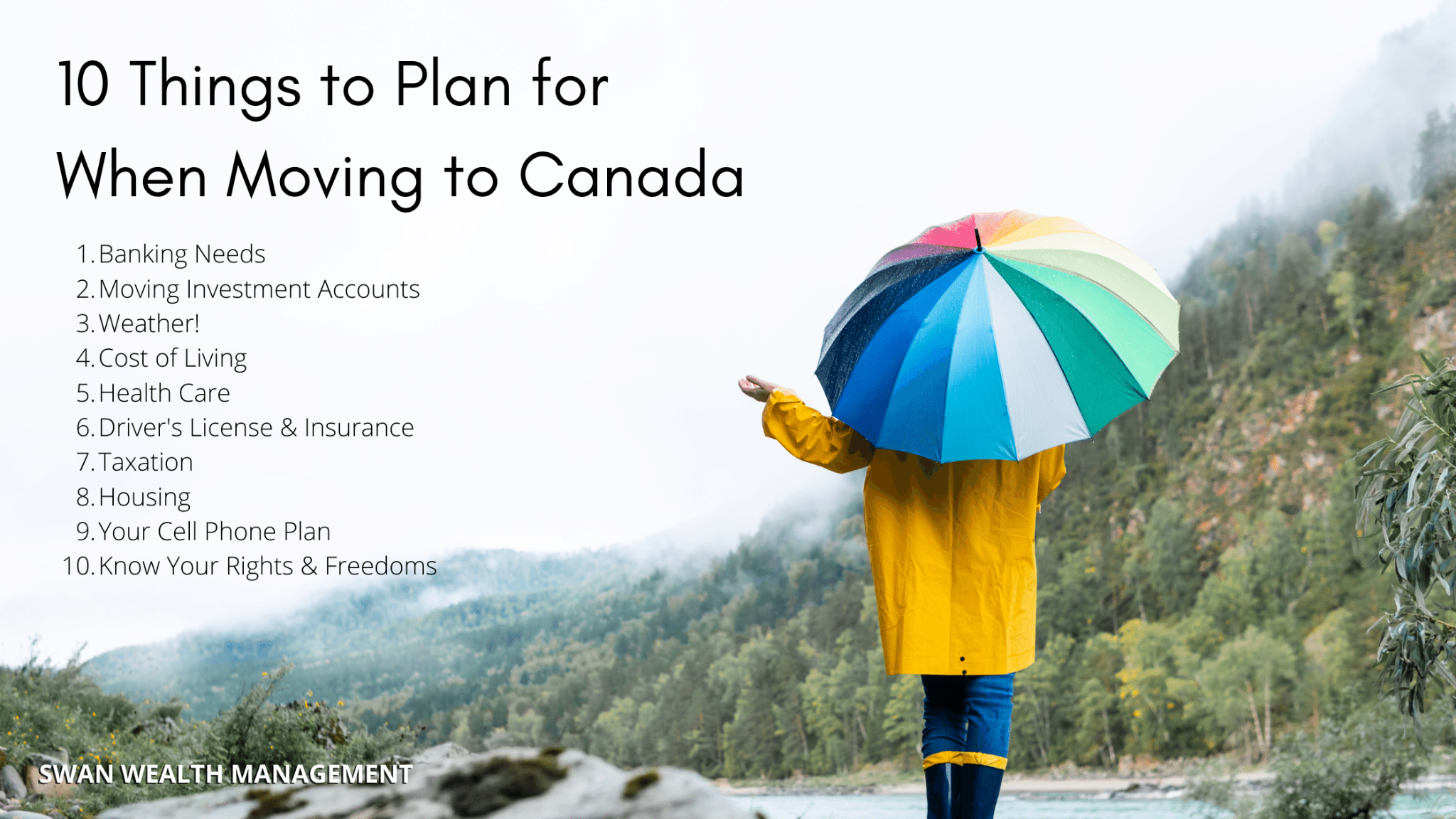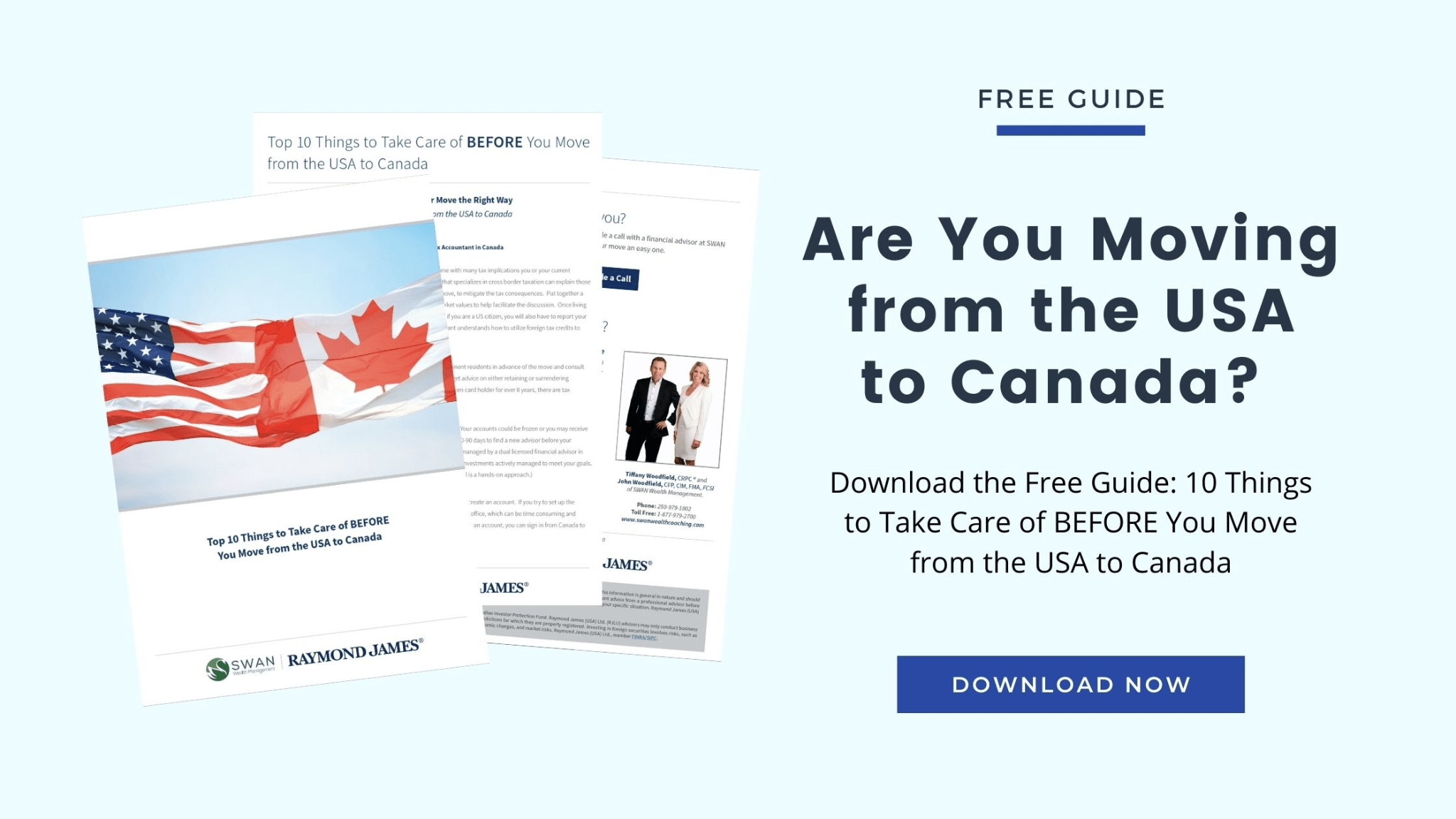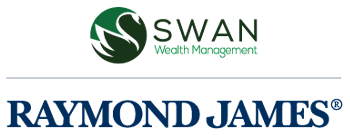Top Things to Know Before Moving to Canada | Moving Guide
Written by Tiffany Woodfield, Portfolio Manager, CIM® CRPC®
Reading Time: 8 minutes
So you're planning on moving to Canada!
You're ready for your next adventure, and now it's time to start getting organized. There are hundreds of things you'll take care of before you move, but these are essential things to know before moving to Canada.
You don't want to skim through this. Because without the right information and planning, your move will be much more difficult and stressful than it needs to be.
As a cross-border financial advisor, I understand what it takes to effectively move across the border. My team and I have spoken with hundreds of people who are moving from the US to Canada. Everyone has slightly different circumstances. But the basics are still the same.
Based on our experiences with clients moving to Canada, we've created this list to make sure you're prepared.
The good thing is that it can be a simple and enjoyable process if you plan your move well in advance. Well, maybe not simple the entire time. You do have to cross a border, after all. And who likes packing? Nobody, that's who.
But you can make this process so much easier if you know all the essentials in advance. Alright, let's get to it.
Here are the 10 essential things you need to know before moving to Canada:
TABLE OF CONTENTS
- Banking in Canada
- Moving Your Investments to Canada
- Planning for the Weather
- Cost of Living
- Canada’s Health Care is Amazing, But...
- Your Driver’s License and Insurance in Canada
- Taxation in Canada
- Canada’s Housing Market and Why You Should Plan in Advance
- Getting a Cell Phone Plan
- Charter of Rights and Freedoms
- BONUS: The Culture of Politeness

#1 Banking in Canada
When you are moving across the border, I recommend keeping your bank account in the US. Doing so makes it easier when you start taking US pensions such as social security. For a US person opening a bank account in Canada, it isn't as easy as you might think, especially if you aren't already a Canadian resident.
The simplest solution may be to go with a US bank that has a Canadian branch. You can do this from the US. If you are already living in Canada, opening a bank account will be much easier if you bring the correct documentation.
Examples of documents you may need are:
- a current Canadian passport
- Canadian driver's license
- Permanent resident card
- health insurance card
- Social insurance card issued by the Government of Canada.
For more information, go to:
How US Citizens Can Open a Bank Account in Canada Without Leaving Home
CREDIT CARDS
It is also often surprising for people to find out their credit rating from the US does not transfer to Canada. So when they apply for a credit card, they are disappointed with how low their limit is, especially when purchasing all their new furniture after the move.
When you arrive in Canada, apply for a credit card right away to establish your credit history.
#2 Moving Your Investments to Canada
If you're planning on moving to Canada permanently and have investments in another country, you may want to consider moving them to Canada. As a cross-border financial advisor, my expertise is in helping people manage their investments in both the US and Canada. So if you're coming from the UK, India, China, or other countries, there may be more details to consider than what I've listed below.
However, if you're moving from the US, these are the main things you need to know in advance:
- Your US brokerage firm likely will no longer be able to help you once you are a non-resident of the US. The rules are not new, but the major US brokerage firms are enforcing these rules more strictly. They have been sending letters stating you have 30-90 days to close your account or find another advisor.
- It is rarely tax neutral to move an IRA or 401(k) into an RRSP
- A Canadian-only financial advisor will not be able to manage your IRA or Roth IRA.
- There is an option to work with a dual-licensed financial advisor licensed and regulated in Canada and the US. They can manage and offer advice on IRAs as well as Canadian investments.
- Strategies that worked in the US for investments are likely different when you live in Canada. (In particular, in a taxable open account.) This is because each country has investments that are taxed favourably as a resident of that country.
- You will likely face a higher tax bill if you do not consult with a cross-border accountant and cross-border financial advisor before and after your move.
- You need to take a few important steps to bring a Roth IRA to Canada to maintain the tax-deferred status.
- By investing in Canadian mutual funds or ETFs, you will face extra reporting and headaches. These are considered passive foreign investment companies PFICs by the IRS.
#3 Planning for the Weather
If you're moving from a warm climate, you may not be prepared for Canadian winters. They are no joke. Unless you're moving to the West Coast of British Columbia, you should know that there will be four to six months of the year that you'll be bundled up in a winter coat. If possible, move to Canada in the spring, summer, or fall.
Canada's weather tends to be nicest from May 1 to November 15.
On the other hand, if you move to Canada's West Coast, prepare for rain. While climate change has made the West Coast somewhat drier, it still has plenty of drizzling days. Prepare to learn to love your umbrella.
#4 Cost of Living
It is important to consider the tax impact of your move and the cost of living in Canada. Different cities and areas vary vastly in regards to cost.
For example, the most expensive cities are Toronto and Vancouver, with the surrounding areas not far behind. Many other options may be easier on your budget depending on your interests, such as culture, entertainment, or the natural outdoors.
For more about the most expensive areas for buying a home, check out these articles:
◽ These Are the Most Expensive Areas for Home Buying in Canada
◽ Things to Know BEFORE Moving to Kelowna
◽ 7 Best Places to Live in Canada as an American
#5 Canada’s Health Care Is Amazing, But...
In most provinces, you will need private health insurance for the first three months while you wait until your public medical insurance is approved.
About 70% of the medical services for Canadian citizens and permanent residents are covered. This includes emergency services, doctor visits, hospital stays, surgeries and maternity services. You may need extended healthcare for services such as dental care, massage therapy, physiotherapy, and prescription medication and prescription glasses.
The downside is you may find it difficult to find a family doctor. The option to go for a walk-in clinic is still available. However, the walk-in clinic won't have your family history.
For more on this topic, visit the Canadian government site:
Understand how health care works in Canada
#6 Your Driver's License and Insurance in Canada
When you move across the border, your US driver's license is still valid for up to six months. Then you will need to apply for a Canadian driver's license and Canadian auto insurance. You will need to prove two years of driver's history to get a driver's license in Canada. If you just renewed your license in the US, it won't show two years.
So before you move, get your driving history and keep the contact information of your US insurance company handy. In Canada, with proof of 10 years of good driving, you can get the largest reduction in your insurance costs.
#7 Taxation in Canada
As a US citizen or long-term green card holder, you are at risk of facing double taxation when you become a permanent resident without proper advice. On top of this, taxation in Canada is higher compared to the US. Also, provincial taxes vary across provinces.
To get an idea of tax rates, take a look at the federal tax rates in BC and Ontario below:
Current Top 2021 Tax Rates for BC Provincial and Federal
Salary, interest, pension, foreign 53.50%
Eligible dividends 36.54%
Non-eligible dividends 48.90%
Capital gains 26.75%
>Top rates apply to taxable income over $222,420 and $220,000 (2020) based on known federal and BC rates at April 20, 2021
Current Top 2021 Tax Rates for Ontario Federal and Provincial
Salary, interest, pension, foreign income 53.53%
Eligible dividends 39.34%
Non-eligible dividends 47.74%
Capital gains 26.77%
>Top rates apply to taxable income over $220,000 based on known federal and provincial rates as of March 24, 2021.
Federal Income Tax rates 2021 US
Single Filing 35% Based on income of $209,426 to $523,600
Married Filing jointly 24% Based on income of $172,751-$329,850
Married Filing Separately 35% Based on income of $209,426- $314,150
Long term Capital gain/ Qualified Dividend Income varies from 0-20%
>This does not include state tax as it varies greatly from state to state.
#8 Canada's Housing Market and Why You Should Plan in Advance
The Canadian housing market in 2021 may be in a bubble as market prices have hit record highs. It is being driven by increased demand and low mortgage rates.
Currently, in many popular locations, homes are selling above the asking price with multiple bids. I recently spoke with clients who moved here and had to stay in an Airbnb for an extended period. They had multiple homes where they were not the successful winners of the bids.
Moreover, builders have been in a frenzy, and the time to completion of your dream home is often longer than expected.
#9 Getting a Cell Phone Plan
Prepare to be shocked by the price of communication in Canada. We have a telecommunications monopoly which means our cell phone plans are probably the most expensive in the world. Most working Canadians have plans of over $80/month or more. The Internet is similarly pricey, with many people paying over $100/month. While you may be shocked at first, you'll get used to it.
In BC, the top cell phone providers include Telus, Koodo (which is owned by Telus), Bell and Rogers. Bell is known for having the best service in Canada, but Telus is close behind it. If you like to manage all your services online with ease, Koodo is likely your best option. And don't be fooled by the low-cost cell phone companies because they usually don't have good service or customer support. Go with the top communications companies and get better service and support.
#10 Charter of Rights and Freedoms
Canada is a diverse country founded on mutual respect. The Charter of Rights and Freedoms plays an important role in that.
Living in Canada, you will find that it is a diverse country where everyone has essentially seven categories of rights and freedoms under which they are protected by the Canadian charter.
These are:
Fundamental Freedoms
Everyone is free to express their religious beliefs in public, whether by wearing religious clothing or through prayer. You are allowed to speak your mind and express your views in creative ways.
Democratic Rights
Everyone who is a Canadian citizen over the age of 18 can vote in Canada.
Mobility Rights
This is the right of permanent residency and Canadian citizens to live or look for work anywhere in Canada. You cannot be discriminated against because of where you used to or currently live.
Legal Rights
- Right to be secure against unreasonable search and seizure.
- Interactions with the justice system.
- Protection against unreasonable laws.
- Protection against arrest without good reason.
- Rights after arrest.
- Protection against cruel and unusual punishment.
- Rights in court.
Equality Rights
These rights are intended to ensure that you are treated with respect, dignity and consideration regardless of your race, nationality, skin colour, religion, sex, age or mental/physical abilities, sexual orientation, residency, marital status or citizenship.
Official Language Rights
English and French are the official languages. Everyone has the right to communicate and receive services in English or French from the government or any institution of Canada.
Minority-Language Rights
This is the right to minority-language instruction. Canadian citizens outside of Quebec have the right to send their kids to French schools. Citizens living in Quebec have the right to send their kids to English schools.
#11 Extreme Politeness and Respect Is the Norm
Canadian culture might seem odd at first if you're not used to living in a country where people are polite to a fault. If one person accidentally bumps into another in the grocery store, both people will say sorry. We like to apologize if there's even a hint of inconvenience.
But aside from saying sorry, we also use please and thank you judiciously. We just like to pepper our speech with politeness.
Does this sound odd? Well, it's okay. You'll get used to it. There are some great side benefits to all this politeness. Being polite and being conscientious is synonymous within this culture. If you leave your wallet in a park or restaurant, don't be surprised to get a phone call or Facebook message from someone who wants to drop it off for you. Then don't be surprised if all the money is still in your wallet. Depending on where you're from, this might seem a little crazy. But in Canada, taking politeness seriously is a national pastime.
Key Takeaways in this Article:
- Consider the cost of living in the various cities and do your real estate research early.
- Canada has a universal healthcare system, but it does not cover all costs. Make sure you have insurance before you arrive, as it will usually be three months before your Canadian health insurance kicks in.
- Moving your investments and managing your assets requires planning. You can prevent double-taxation with good advanced planning.
- It may be more difficult to open a bank account than you think. So keep your bank account open in your home country.
- Getting a driver's license is easier if you have your driver's history and paperwork from your home country.
Next Steps
If you’re planning on moving to Canada and need assistance with moving your investments, estate planning, and portfolio management, please get in touch. At SWAN Wealth we specialize in cross-border financial planning and wealth management.

More Cross-Border Financial Planning Articles & Guides
If you’re planning a cross-border move, these articles and guides will help you simplify your move and make sure you’ve got everything covered.
Cross-Border Estate Planning Guide
Roth IRA Canada: How to Manage Your Investments Across the Border
The Ultimate Financial Planning Resource for Dual Citizens or Green Card Holders Living in Canada
401k in Canada - How to Stay Onside with the IRS and Avoid a Large Tax Bill
Retiring to Canada - A Financial Planning Guide
Financial and Tax Planning for US Citizens Living in Canada
Canadian RRSP Facts for Dual Citizens, Expats and Canadians
About the Author
Tiffany Woodfield is a Portfolio Manager, and the co-founder of SWAN Wealth Management, along with her husband, John Woodfield. Tiffany specializes in advising clients who live both in Canada and the United States and want to simplify their cross-border financial plan, move their assets across the border, and optimize their investments so they can minimize their tax burden. Together Tiffany and John Woodfield help their clients simplify their cross-border finances and create long-term revenue streams that will keep their assets safe whether they live in Canada or the US.
Schedule a Call
Book a 15-minute introductory call with SWAN Wealth Management. Click here to schedule a call.
Information in this article is from sources believed to be reliable, however, we cannot represent that it is accurate or complete. It is provided as a general source of information and should not be considered personal investment advice or solicitation to buy or sell securities. The views are those of the author, SWAN Wealth Management, and not necessarily those of Raymond James Ltd. Investors considering any investment should consult with their Investment Advisor to ensure that it is suitable for the investor’s circumstances and risk tolerance before making any investment decision. Raymond James Ltd. is a Member - Canadian Investor Protection Fund. Raymond James (USA) Ltd., member FINRA/SIPC. Raymond James (USA) Ltd. (RJLU) advisors may only conduct business with residents of the states and/or jurisdictions for which they are properly registered.



